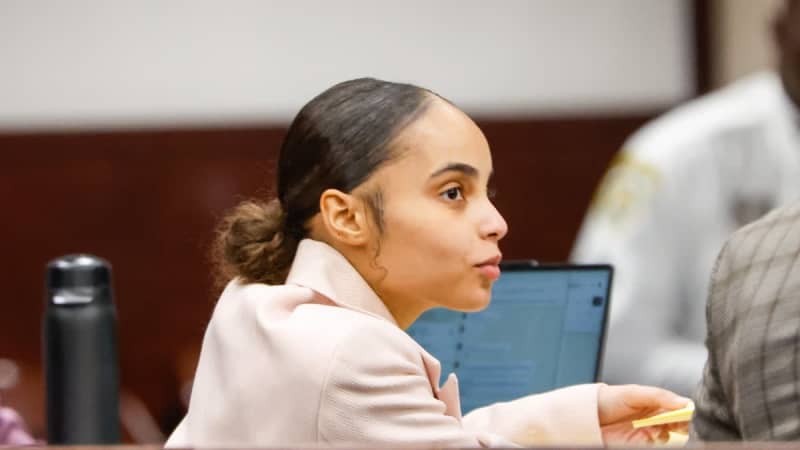TAMPA — The gunshots that ended the life of rapper Julio Foolio came from two assault rifles and a handgun carried by three men a prosecutor described as being dressed like ninjas.
The armed assault one early morning last year in a Tampa hotel parking lot was the end goal of what the state says was a calculated five-person murder conspiracy — the pinnacle of a gang war that had raged for a decade.
On Wednesday, one of the alleged conspirators went before a jury.
Prosecutors say Alicia Andrews was deeply enmeshed in the plans to stalk and murder Foolio, whose real name was Charles Jones. She and her boyfriend, Isaiah Chance, acted as lookouts, the state says, following Foolio and calling in updates to the rest of the group during the final hours of his life.
The defense contends that Andrews knew nothing of the murder plot and that she only tagged along with her boyfriend the morning the shooting happened.
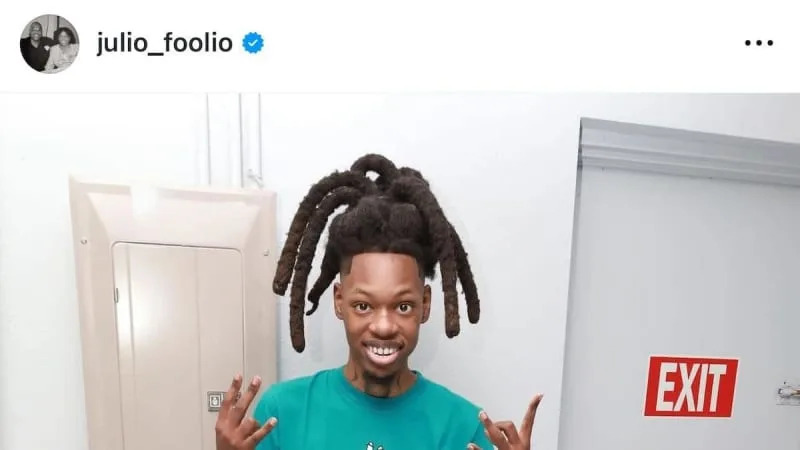
In an opening statement, Assistant State Attorney Scott Harmon used military terms like “assault team” and “reconnaissance” and “ambush” to describe a coordinated operation whose single goal was to end Foolio’s life. The shooters, he said, armed themselves to have “not fire superiority, but fire supremacy.”
Although Andrews was not one of them, the prosecutor said she is just as guilty, having helped carry out the deadly plot.
“She was there with them, in the field, shoulder-to-shoulder, in the thick of it,” Harmon said.
Defense attorney Life Malcolm, in an impassioned address to to the jury, asserted that Andrews was not in a gang, nor was she involved in the Jacksonville rap scene. She came to Tampa as a weekend getaway with Chance, 22, whom Malcolm described as controlling and possessive of the young woman.
“There was no evidence whatsoever that Alicia Andrews killed Charles Jones,” Malcolm said. “No evidence whatsoever that Alicia Andrews wanted Charles Jones dead. No evidence whatsoever that Alicia Andrews did anything to help that group of men kill Charles Jones. You are not here to deliver a verdict. You are here to right a wrong.”
Andrews, 22, is charged with first-degree murder and conspiracy to commit murder with Chance and three other men: Rashad Murphy, 31, Davion Murphy, 28, and Sean Gathright, 20.
Andrews is the only defendant not facing the death penalty. Her trial is unfolding separate from the rest, three of whom are set to go before a jury together next year. If she is convicted as charged, she faces a mandatory penalty of life in prison.
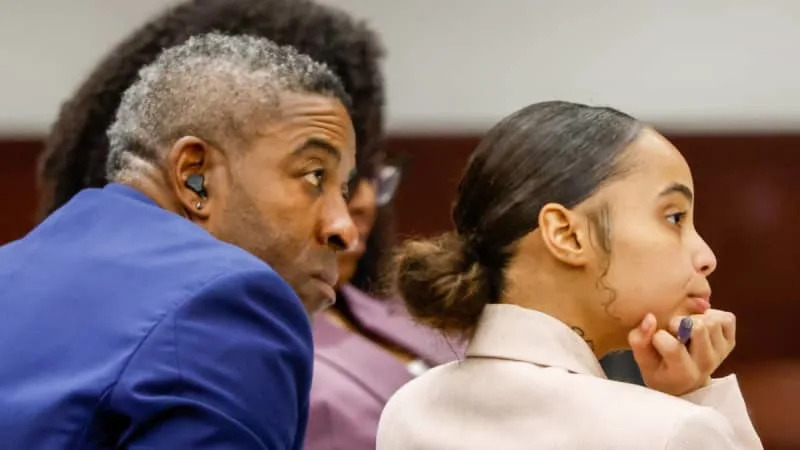
Julio Foolio was a celebrity whose music was popular and who boasted millions of social media followers.
He was also, according to prosecutors, the most well-known member of a Jacksonville street gang known as “6 Block.” He was seen as the gang’s icon.
For more than a decade, 6 Block has engaged in what Harmon called a war with two allied gangs known as “1200″ and “ATK,” the latter an acronym for “Ace’s Top Killers.” Jacksonville police have attributed dozens of murders in that city to the ongoing war. References to the violence dominates music produced by members of both groups.
The state’s evidence includes music videos described as “drill” tracks, a rap subgenre marked by dark lyrics often filled with references to gang warfare.
One video, available on YouTube and played in court in a pretrial hearing last year, featured a track called “Who I Smoke.” Set to the tune of Vanessa Carlton’s pop single “A Thousand Miles,” the video features ATK members in polo shirts and khaki shorts dancing on a golf green as they recite lyrics that appear to boast about the shootings of specific people.
“Left his ass in the street, this the end of your life, boy,” one vocalist says. “Last thing your ass see, a flashlight on this MAC, spark.”
The war was waged in words on social media, where Foolio posted photos and videos of himself lying down, drinking Champagne and dancing on the graves of dead gang members.
His track titled “When I See You” mentioned several dead men by name.
“Smokin’ 23, that boy died on his birthday,” he crows in one verse. “Happy birthday, I got him a present, but he dead he can’t celebrate.”
It all came to a head the weekend of June 22, 2024.
Foolio advertised on Instagram a weekend celebration marking his 26th birthday in Tampa. The events included a planned performance at Teasers, a Tampa strip club on North Nebraska Avenue, and an after-party at the Truth 18 nightclub on East Busch Boulevard.
Andrews and Chance followed him to both locations, prosecutors said.
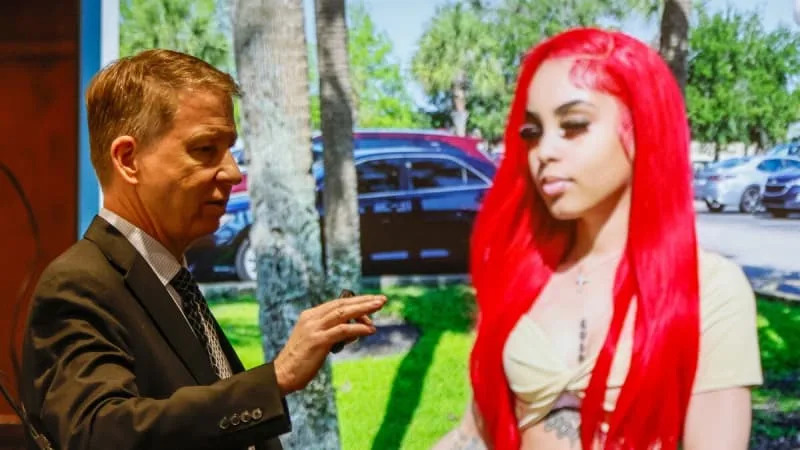
Harmon walked the jury through volumes of evidence that included surveillance videos from outside the clubs showing Andrews and Chance walking around and talking on a cellphone. It was Andrews who booked the Airbnb where the group stayed that weekend, Harmon said. And she was present in a car that early morning when the Murphys and Gathright, with guns in hand, descended on Foolio’s car.
It was after 4 a.m. when the cars left Truth 18 and arrived at the Home 2 Suites on East Busch Boulevard near the University of South Florida. The Dodge Charger carrying Foolio stopped beside an overhang outside the lobby.
The rapper lay reclined in the front passenger seat, his feet resting on the dashboard, as his friends tried to book a room. About a minute later, surveillance cameras caught images of three hooded, masked men emerging from a car parked nearby. Two carried assault rifles. The other held a handgun with an extended magazine.
Flashes erupted from the ends of muzzles. Dozens of bullets tore through the Charger’s windshield as the driver tried to speed off. Foolio jolted up and dove into the backseat. He was shot in the chest and back. He died instantly. Three of his friends were wounded but survived.
The gunmen quickly fled.
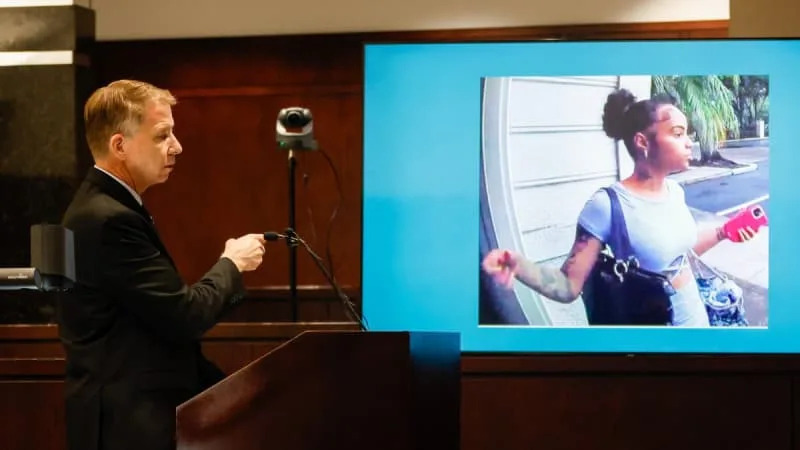
The assassination stood out among other Tampa homicides last year for its brazenness and seemingly calculated nature. Tampa detectives led a complex investigation that crisscrossed the Sunshine State. It culminated in the arrests that July of Rashad Murphy, Gathright, Chance and Andrews. Davion Murphy remained a fugitive for months before he, too, was arrested.
Andrews sat quietly through two days of jury selection, flanked by an eight-person defense team. More than 80 prospective panelists were questioned on a broad range of topics, including their knowledge of rap music, use of social media, thoughts on gang activity, opinions on people who have tattoos and familiarity with high-profile criminal cases.
Close to a third of the panelists had heard about Foolio’s murder. Few knew many details. Those chosen said they had formed no preconceived opinions about the case and could remain impartial.
Malcolm offered for the jury a character sketch of a bright young woman, perhaps a bit naïve, who’d gotten accepted to college and worked as a substitute teacher.
“Alicia Andrews had one agenda,” Malcolm told the jury. “To be with her boyfriend.”
The trial is set to last through next week.
Times staff writer Anthony Nicotera contributed to this report.

